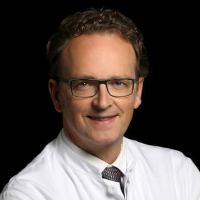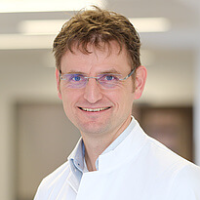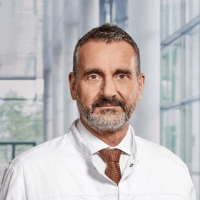Pulmonary valve replacement for pulmonary valve insufficiency treatment in Germany
Treatment prices are regulated by national law of the corresponding countries, but can also include additional hospital coefficients. In order to receive the individual cost calculation, please send us the request and medical records.

Department of Cardiothoracic Surgery
According to the Focus magazine, the Department of Cardiothoracic Surgery ranks among the top German medical facilities specializing in the surgical treatment of diseases of the cardiovascular system and lung cancer! The department offers the full range of surgical services for the treatment of diseases of the cardiovascular system, respiratory tract, including heart and lung transplantation, artificial heart implantation. The therapeutic options include aortic surgery, coronary artery bypass grafting, transplantation surgery, surgical treatment of heart rhythm disorders (arrhythmias), minimally invasive surgery, surgical treatment of the heart valves, including reconstructive interventions. All operations are performed using state-of-the-art technology and in accordance with the current recommendations of professional societies.






Department of Cardiac Surgery
The Department of Cardiac Surgery provides a full range of surgical treatment in its area of specialization. Special emphasis is placed on heart valve repair and replacement surgery, coronary artery bypass grafting, thoracic aortic surgery, adult congenital and acquired heart disease surgery, pacemaker and defibrillator implantation, and artificial heart implantation for severe heart failure. Many heart operations are performed using minimally invasive techniques, which has a positive effect on the healing of the surgical wound. Minimally invasive cardiac procedures also reduce surgical risks and contribute to a rapid recovery of the patient in the postoperative period. Surgical treatment of cardiac pathologies is performed in advanced operating rooms equipped with the latest technology. The cardiac surgeons of the department successfully perform routine and complex surgical procedures, saving the lives of thousands of patients. The specialists work in accordance with current clinical protocols and follow the recommendations of the German Society for Thoracic and Cardiovascular Surgery (DGTHG).


Department of Cardiothoracic Surgery and Vascular Surgery
The Department of Cardiothoracic Surgery and Vascular Surgery provides effective surgical treatment for diseases of the heart, respiratory system, and blood vessels. The team of cardiac surgeons operates on patients with heart valve pathologies, coronary heart disease, heart failure, and heart rhythm disturbances. In the field of thoracic surgery, the key focus is on the surgical removal of lung tumors and lung metastases. The specialists in this area also perform surgery to repair chest wall deformities. In the field of vascular surgery, interventions for abdominal and thoracic aortic aneurysms are most often performed here. The department's vascular surgeons are also exceptionally competent in the treatment of peripheral occlusive arterial disease. A great advantage for the department's patients is that almost all surgical interventions are performed using minimally invasive techniques, so there is no need for a long postoperative recovery. The department's operating rooms are equipped with state-of-the-art technology. This allows for effective and safe treatment. The priority is always personalized medical care for patients.






Pulmonary valve insufficiency is a rare heart disease that is usually caused by a medical intervention, most often by surgical repair of the tetralogy of Fallot and less often by balloon angioplasty for pulmonary valve stenosis. The disease develops in young patients or children. Symptoms may appear years or even decades after the onset of a pulmonary valve disease, as patients may develop right ventricular failure over time. The disease can be cured by surgical valve replacement. You can seek medical attention at one of the German hospitals to get top-class medical care. You can find out the cost of treatment in Germany and choose a medical care program at the best price on the Booking Health website.
Content
- Who may need pulmonary valve replacement surgery for its insufficiency?
- How is pulmonary valve replacement surgery performed to treat its insufficiency?
- Treatment results for pulmonary valve insufficiency
- Minimally invasive pulmonary valve implantation for its insufficiency
- Why is it best to undergo your pulmonary valve insufficiency treatment in Germany?
- Organization of your pulmonary valve insufficiency treatment in Germany
Who may need pulmonary valve replacement surgery for its insufficiency?
Severe pulmonary valve insufficiency develops in approximately 20% of patients who have undergone radical repair of a congenital heart disease such as tetralogy of Fallot.
The main goal of treatment is to preserve the function of the right ventricle. At the same time, it is important not to perform the operation too early, because a bioprosthesis implanted in childhood lasts a relatively short time, and mechanical ones are not implanted in the position of the pulmonary valve due to a high risk of thrombosis.
Indications for pulmonary valve replacement are the following:
- the right ventricular end-diastolic volume (RVEDV) exceeds 160 ml/m2;
- the ratio of the end-diastolic volume (EDV) of the right and left ventricles is greater than 1.5 and a patient has symptoms;
- the ratio of end-diastolic volume (EDV) of the right and left ventricles is greater than 2 in patients without any symptoms of the disease.
If these values have not yet been reached but a doctor can see that the pathology is rapidly progressing when monitoring the patient's dynamics, he can offer pulmonary valve replacement surgery without waiting for a significant impairment of the right ventricular function.
How is pulmonary valve replacement surgery performed to treat its insufficiency?
Pulmonary valve replacement is performed under general anesthesia using normothermic (without lowering the temperature) cardiopulmonary bypass.
A doctor makes an incision in the patient's chest to approach the pulmonary artery, which is followed by the implantation of an artificial pulmonary valve. A prosthesis can be mechanical or biological. Although mechanical artificial prosthetic valves exist, doctors most often perform biological heart valve implantation to reduce the risk of complications.
Treatment results for pulmonary valve insufficiency
Pulmonary valve replacement causes the symptoms of heart disease to disappear and the right ventricle of the heart to gradually improve its function.
The service life of prostheses is limited as they wear out over time. In a mixed group of children and adult patients, it is 80% within 5 years, 60% within 10 years, and 40% within 15 years. At the same time, prostheses wear out faster in children. Only one in four adult patients needs a revision surgery 15 years after the first replacement.
Even with the long service life of a bioprosthesis, its replacement will be required sooner or later because most patients with pulmonary valve insufficiency are children and young adults. Doctors can perform a percutaneous implantation of a new prosthetic heart valve inside an old, damaged bioprosthesis to avoid open revision surgery.
Minimally invasive pulmonary valve implantation for its insufficiency
Percutaneous pulmonary valve implantation is performed in German hospitals mainly in the case of revision replacement surgery due to dysfunction of the previously implanted bioprosthesis. Less commonly, it can be performed for primary replacement surgery, as it is possible only if a patient has a small diameter of the pulmonary trunk.
The implantation of the heart valve is done through an incision in the groin. The stent valve is delivered to the pulmonary artery through the blood vessels, and no incisions in the chest are required. The artificial pulmonary valve implantation procedure is minimally traumatic for the patient, which ensures a mild postoperative period and a quick return to normal life.
Modern heart valves for percutaneous implantation are becoming more sophisticated and can ensure good hemodynamic parameters. The results of minimally invasive implantation are comparable to those of open surgical interventions.
Why is it best to undergo your pulmonary valve insufficiency treatment in Germany?
Surgical replacement of pulmonary valves is complex and unsafe. It is therefore best to undergo it at a specialized Heart Surgery Center. Such operations are usually successful in German hospitals and provide patients with good, long-term results. They also have a low mortality rate and a low risk of complications.
There are a few reasons for you to undergo your treatment in Germany. These are the following:
- surgical interventions are performed by highly qualified cardiac surgeons with a worldwide reputation;
- German hospitals have state-of-the-art equipment;
- modern models of artificial pulmonary valves are used, which have a long service life and a low risk of thromboembolic complications;
- simultaneous interventions on different heart valves can be performed, most often on the pulmonary and tricuspid heart valves;
- in addition to open surgical interventions, German hospitals perform minimally invasive implantation of stent valves through a small incision in the leg.
In German hospitals, operations are successfully performed on patients of any age, including those with a large diameter of the pulmonary artery, concomitant right ventricular failure, congenital heart defects, etc. Treatment in Germany is effective even in the most complex clinical cases. A timely operation allows patients to fully restore their hemodynamics and prevent right ventricular dysfunction.
Organization of your pulmonary valve insufficiency treatment in Germany
You are welcome to use the Booking Health service to undergo your pulmonary valve insufficiency treatment in Germany. On our website, you can find out the cost of treatment in Germany, compare prices in different hospitals, and choose a medical care program for your preferred dates. The specialists at the Booking Health company will help you find a hospital in Germany that specializes in the treatment of valvular heart disease and achieves the best results.
When you make your appointment through Booking Health, the cost of treatment in Germany will be lower for you due to the lack of additional taxes for foreign patients. The initial price will definitely not increase since you will receive insurance that will cover out-of-program medical expenses for patients.
The Booking Health employees will take care of all the arrangements for your trip to Germany for pulmonary valve replacement surgery. We will contact the administration of the German hospital, book a hotel room and airline tickets, and translate your medical documents. We will meet you at the airport in Germany and take you to the hospital by car. We will also provide interpreting services and support during the entire period of your stay in a foreign country.
Authors:
The article was edited by medical experts, board-certified doctors Dr. Nadezhda Ivanisova and Dr. Vadim Zhiliuk. For the treatment of the conditions referred to in the article, you must consult a doctor; the information in the article is not intended for self-medication!
Sources:
ECR - European Cardiology Review

